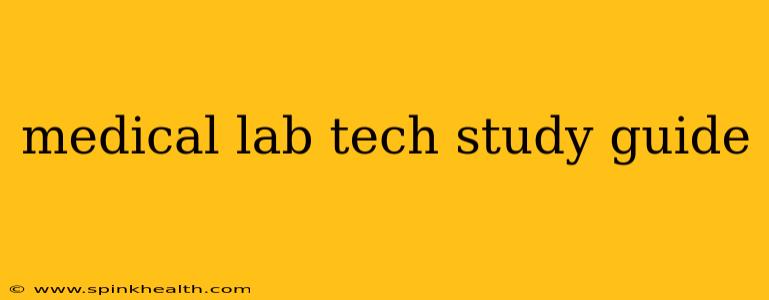Ace Your Medical Lab Tech Exams: A Comprehensive Study Guide
So, you're embarking on the exciting journey of becoming a medical lab technician? Congratulations! This path demands dedication, precision, and a thirst for knowledge. This isn't just a job; it's a crucial role in healthcare, impacting countless lives. To help you navigate your studies and conquer those exams, I've crafted this comprehensive study guide, drawing on years of experience and insights from the field. Think of it as your trusty sidekick throughout your educational adventure.
Let's begin our journey by addressing some common questions that aspiring medical lab techs often have.
What are the key subjects I need to master?
This is a foundational question, and the answer depends on the specific program you're enrolled in. However, some core subjects consistently appear across curricula. Imagine them as the building blocks upon which your entire career rests. These pillars include:
-
Hematology: This is the study of blood, its components, and associated diseases. Picture yourself as a blood detective, identifying abnormalities and contributing to crucial diagnoses. You'll delve into red blood cell counts, white blood cell differentials, platelet analysis, and coagulation studies – essential for detecting everything from anemia to leukemia.
-
Clinical Chemistry: This involves analyzing body fluids like blood and urine to measure the levels of various chemicals and metabolites. You'll become proficient in operating sophisticated analyzers and interpreting results, identifying clues to kidney disease, liver dysfunction, heart problems, and much more. It's like being a biochemical sleuth, piecing together the body's intricate chemical puzzle.
-
Microbiology: This fascinating area introduces you to the microscopic world of bacteria, viruses, fungi, and parasites. You'll learn to identify infectious agents, perform culture tests, and contribute to the fight against infectious diseases. This involves meticulous techniques and careful interpretation of results, crucial in ensuring patient safety.
-
Immunology: Understanding the body's immune response is critical. You'll delve into the intricacies of antibodies, antigens, and immune system function, playing a vital role in diagnosing autoimmune disorders and infectious diseases. This section requires a solid grasp of complex processes and their practical applications.
-
Urinalysis: This involves the examination of urine samples, a relatively simple yet crucial diagnostic test. You'll learn to assess color, clarity, pH, and the presence of various components, which can provide valuable insights into kidney function and other health issues. It's a fundamental skill that you'll use frequently.
What are some effective study strategies for medical lab tech students?
Studying for medical lab technology exams isn't about simply memorizing facts; it's about developing a deep understanding of complex processes. Here are some strategies proven to yield outstanding results:
-
Active Recall: Don't just passively reread your notes. Actively test yourself frequently using flashcards, practice questions, and self-tests. This strengthens memory retention.
-
Spaced Repetition: Review material at increasing intervals. This combats the forgetting curve and enhances long-term memory.
-
Practice, Practice, Practice: Hands-on experience is invaluable. Make the most of lab sessions, practicing procedures and refining your techniques. The more you practice, the more confident you’ll become.
-
Form Study Groups: Collaborating with peers can enhance understanding, provide different perspectives, and make learning more engaging. Discuss challenging concepts and quiz each other.
-
Seek Clarification: Don't hesitate to ask your instructors or TAs for help if you're struggling with a particular concept. Early intervention is key to mastering difficult material.
How do I prepare for the practical portion of the exam?
The practical component of your exams will evaluate your lab skills. Preparation involves more than just theoretical knowledge; it's about developing proficiency in performing various tests and procedures.
-
Master the Techniques: Practice each procedure meticulously, focusing on precision and accuracy. Pay attention to detail, as even minor errors can impact results.
-
Understand the Rationale: Don't just follow steps blindly; understand the underlying principles behind each procedure. This will help you troubleshoot problems and interpret results effectively.
-
Practice Quality Control: Familiarize yourself with quality control measures and understand their importance in ensuring reliable results.
-
Simulate Exam Conditions: Practice performing tests under timed conditions to build your speed and efficiency. This helps to reduce exam anxiety.
What resources are available to help me study?
There’s a wealth of resources to support your studies. Beyond your textbooks and lecture notes, consider:
-
Online Resources: Many reputable websites offer practice questions, tutorials, and interactive learning modules.
-
Professional Organizations: Organizations like the American Society for Clinical Laboratory Science (ASCLS) provide valuable resources and networking opportunities.
-
Study Guides and Textbooks: Invest in high-quality study guides and textbooks that align with your curriculum.
This journey to becoming a medical lab technician is a rewarding one, filled with challenges and triumphs. Remember, consistency, dedication, and a passion for the field are your greatest allies. Embrace the learning process, celebrate your successes, and never stop seeking knowledge. You've got this!

